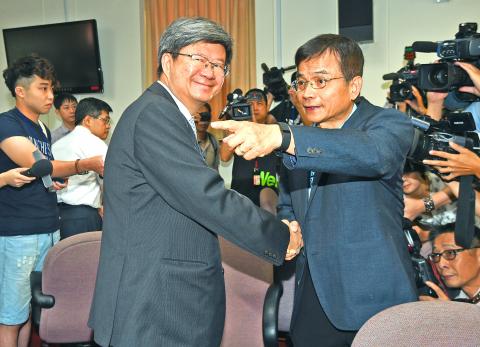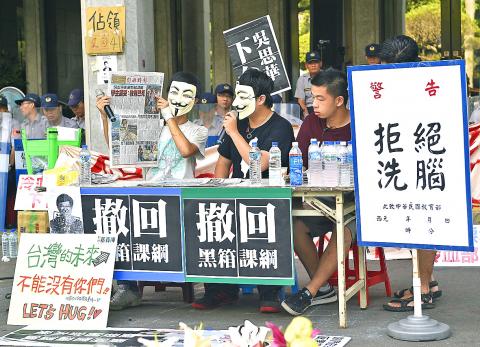A legislative cross-caucus meeting yesterday decided against an extraordinary legislative session, as student protesters had demanded, and instead advised the Ministry of Education (MOE) to immediately launch reviews of curriculum guidelines in accordance with the Senior High School Education Act (高級中等教育法) and to allow schools to freely choose which textbooks they use.
A meeting in the legislature was held yesterday to decide whether an extraordinary legislative session was needed. The meeting had been scheduled to take place at 10:30am, but did not begin until nearly noon, after a prolonged cross-caucus negotiation behind closed doors.
Faced with the Chinese Nationalist Party (KMT) caucus’ strong opposition, the Democratic Progressive Party (DPP) caucus withdrew its proposal to call an extraordinary legislative session to discuss whether to withdraw new curriculum guidelines. Instead, it was agreed in the cross-caucus negotiation that the Ministry of Education would be advised to adhere to Article 43 of the act to immediately establish a “curriculum council” to examine senior-high school curriculum guidelines, and that schools should be free to choose their own textbooks in the new school year.

Photo: Lo Pei-der, Taipei Times
The KMT caucus, in a news conference before negotiations took place, said it had decided during its caucus meeting not to call an extraordinary legislative session for the curriculum controversy. The resolution was approved by “about 50 legislators that attended the caucus meeting” opposing the DPP caucus’ proposal. The KMT holds 65 seats in the legislature.
“Minister of Education Wu Se-hwa (吳思華) was also present [at the caucus meeting] to report on the issue and said that the curriculum was promulgated in February last year. The anti-curriculum [protest] is a pseudo-dispute, since the new curriculum took effect on Saturday and the textbooks have been printed. It is impossible to recall the textbooks,” KMT deputy caucus whip Lin Te-fu (林德福) said.
“Deputy Legislative Speaker and KMT presidential candidate Hung Hsiu-chu (洪秀柱) was at the meeting and agreed with the caucus’ decision not to hold an extraordinary session. She also called for a ‘just’ debate on the issue that should be resolved among adults rather than using kids,” KMT caucus whip Lai Shyh-bao (賴士葆) said.

Photo: Chen Chih-chu, Taipei Times
The Legislative Yuan’s resolution drew a mixed reaction from student representatives, who expressed concerns about the composition and mission of the proposed review committee, while reiterating demands that curriculum guideline adjustments be suspended.
Student spokesman Hsiao Chu-chun (蕭竹均) of the Apple Tree Commune Club said that students did not accept the outcome, but that they still hoped the proposed “review” would lead to a suspension of the guidelines.
“That they have initiated a review committee demonstrates that they believe there are problems with the guidelines’ adoption procedures,” he said. “If there are problems, then the guidelines should be suspended.”
The committee’s membership should be “open” and include academics of Taiwanese history, he said, adding that students should have the right to send representatives.
Hsiao said that students would remain camped in the forecourt of the ministry until it was certain when the review committee would be convened, as well as the composition of its membership.
“We suspect that the committee will not have much of an effect, because it would probably only be charged with writing a report,” Taoyuan High School Alliance convener Peng Cheng (彭宬) said, adding that students hoped the DPP would continue to push for an interim session.
He said the demonstrators would not be dissuaded by the approaching Typhoon Soudelor, and that preparations were already under way to tie down tents and supplies.
Student spokespeople also emphasized that the resignation of Wu would not resolve the current stand-off.
"Wu resigning would only be him taking political responsibility for the absurd things he has done over the past two months — there is no way that his resignation would resolve the problem,” Hsiao said.
Student spokesman Liao Chung-lun (廖崇倫) said that Wu’s comments only showed his “helplessness,” rather than any serious desire to apologize to students.
Students yesterday morning said they would not rule out an “upgrade” to the protests if an interim session was not called, but later said they would need to hold further internal discussions before announcing any further action.
Talks between Wu and a delegation of student leaders, including Northern Taiwan Anti-Curriculum Changes Alliance convener Chu Chen (朱震), broke down after the minister refused to suspend the implementation of the new guidelines.
A report on the legislature’s resolution by DPP caucus whip Ker Chien-ming (柯建銘) yesterday afternoon in the ministry forecourt drew angry remarks from some members of the assembled crowd.
The DPP delegation quickly left the premises after a man stood up and yelled that their report was “crap” and demonstrated the “incompetence” of the DPP.
A brief disturbance erupted after a member of the crowd threw a water bottle at the police cordon in front of the compound, before student leaders re-established order.
Ker was the latest in a string of prominent pan-green politicians to visit the student encampment following Taiwan Solidarity Union Chairman Huang Kun-huei (黃昆輝) yesterday morning and DPP Chairperson Tsai Ying-wen (蔡英文) on Monday night.
Lin earlier yesterday criticized Tsai’s visit, saying: “It is obvious that there was a political force behind the movement, especially when we see Tsai went to the compound.”
Deputy Minister of Education Lin Teng-chiao (林騰蛟) said that the ministry “respected” the legislature’s resolution, urging the students to end their protest “as soon as possible,” as they had already received a “positive response” from both the executive and legislative branches of government.
He added that on Monday the ministry had already stated it was willing to conduct a “rolling review.”
Lin Teng-chiao added that a new curriculum review committee would be convened and the ministry would be open to recommendations about members, including student leaders.
Meanwhile, in response to rumors that Chang An-le (張安樂) — the former leader of the Bamboo Union and founder of the China Unification Promotion Party, also known as the “White Wolf” — would “pass by” the ministry tonight to “urge” the students to go home, Taipei Mayor Ko Wen-je (柯文哲) yesterday said he was not worried, because police would enforce the law, protecting students, as well as preventing the protesters from taking “drastic” action.

SECURITY: As China is ‘reshaping’ Hong Kong’s population, Taiwan must raise the eligibility threshold for applications from Hong Kongers, Chiu Chui-cheng said When Hong Kong and Macau citizens apply for residency in Taiwan, it would be under a new category that includes a “national security observation period,” Mainland Affairs Council (MAC) Minister Chiu Chui-cheng (邱垂正) said yesterday. President William Lai (賴清德) on March 13 announced 17 strategies to counter China’s aggression toward Taiwan, including incorporating national security considerations into the review process for residency applications from Hong Kong and Macau citizens. The situation in Hong Kong is constantly changing, Chiu said to media yesterday on the sidelines of the Taipei Technology Run hosted by the Taipei Neihu Technology Park Development Association. With

CARROT AND STICK: While unrelenting in its military threats, China attracted nearly 40,000 Taiwanese to over 400 business events last year Nearly 40,000 Taiwanese last year joined industry events in China, such as conferences and trade fairs, supported by the Chinese government, a study showed yesterday, as Beijing ramps up a charm offensive toward Taipei alongside military pressure. China has long taken a carrot-and-stick approach to Taiwan, threatening it with the prospect of military action while reaching out to those it believes are amenable to Beijing’s point of view. Taiwanese security officials are wary of what they see as Beijing’s influence campaigns to sway public opinion after Taipei and Beijing gradually resumed travel links halted by the COVID-19 pandemic, but the scale of

A US Marine Corps regiment equipped with Naval Strike Missiles (NSM) is set to participate in the upcoming Balikatan 25 exercise in the Luzon Strait, marking the system’s first-ever deployment in the Philippines. US and Philippine officials have separately confirmed that the Navy Marine Expeditionary Ship Interdiction System (NMESIS) — the mobile launch platform for the Naval Strike Missile — would take part in the joint exercise. The missiles are being deployed to “a strategic first island chain chokepoint” in the waters between Taiwan proper and the Philippines, US-based Naval News reported. “The Luzon Strait and Bashi Channel represent a critical access

Pope Francis is be laid to rest on Saturday after lying in state for three days in St Peter’s Basilica, where the faithful are expected to flock to pay their respects to history’s first Latin American pontiff. The cardinals met yesterday in the Vatican’s synod hall to chart the next steps before a conclave begins to choose Francis’ successor, as condolences poured in from around the world. According to current norms, the conclave must begin between May 5 and 10. The cardinals set the funeral for Saturday at 10am in St Peter’s Square, to be celebrated by the dean of the College